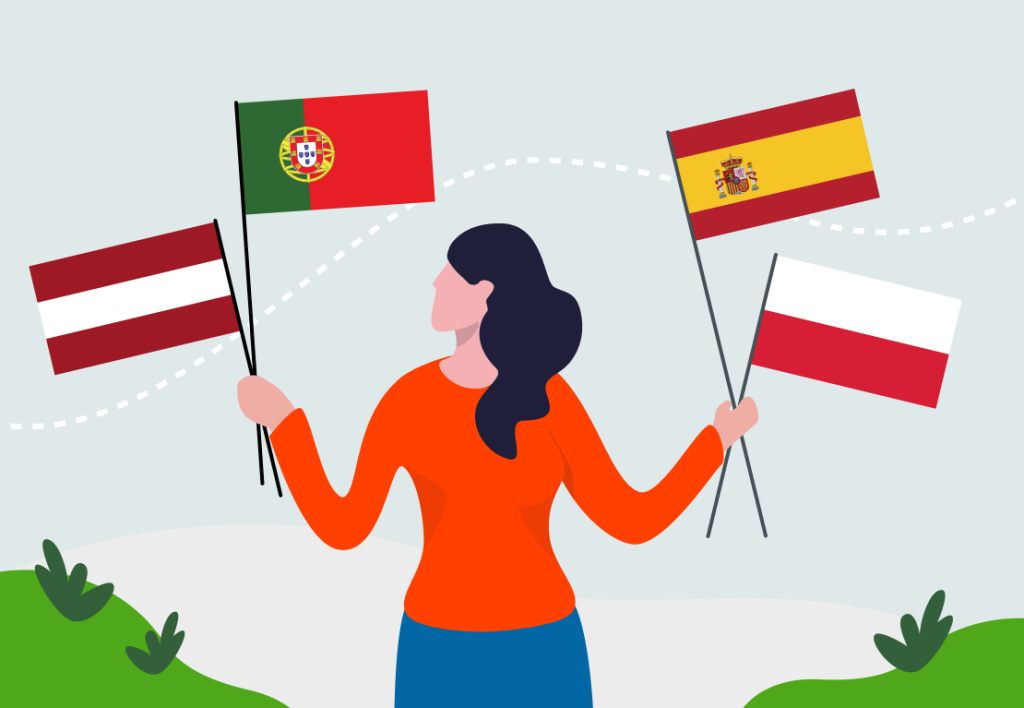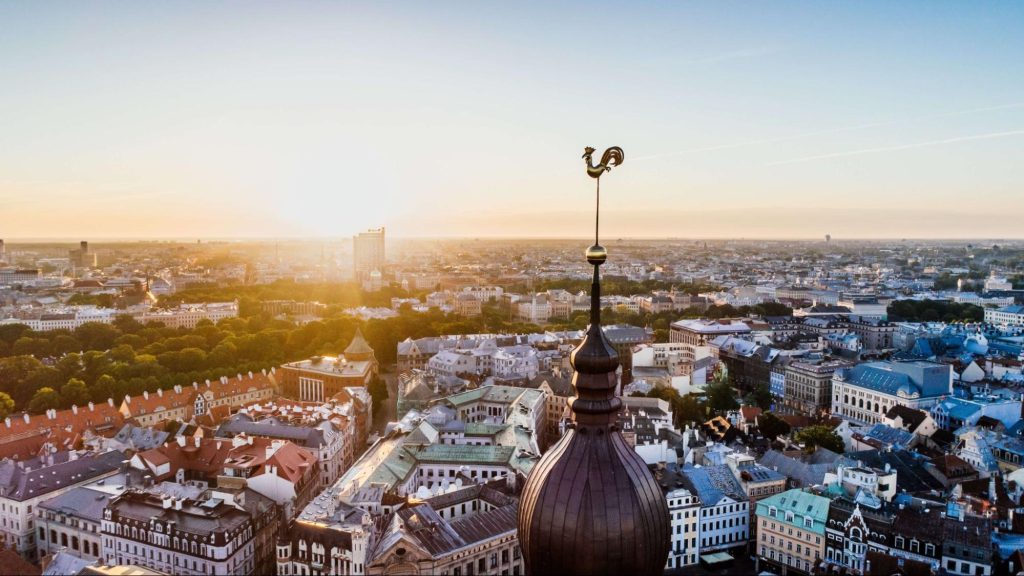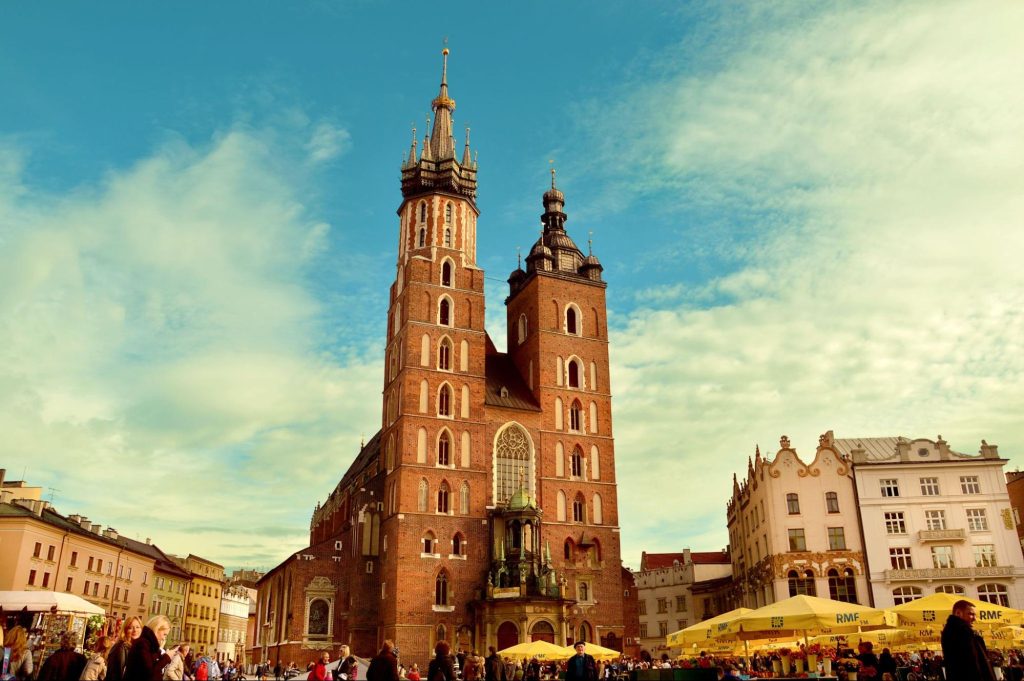Best places for remote work in Europe: 2023 edition

If you’re searching for great destinations for remote work in Europe in 2023, you’ve stumbled upon the right article.
Working from a place that isn’t one’s office is the new normal. Remote work, hybrid work, workations, and digital nomadism have become a natural part of our lexicon, and hearing someone say they’re about to work from another country no longer blows us away.
While technically remote work means you can work from anywhere, let’s be honest, not all places worldwide are remote work-friendly. And that’s ok. But, for the very same reason, it’s good to have insight into places that are suitable for remote workers.
In this piece, I’m looking at the best spots for remote work in Europe, considering several factors. Thus, if you’re contemplating working remotely from Europe, read on.
Want to get the most out of your time?
Try DeskTime for free!
Try free for 14 days · No credit card required.
By signing up, you agree to our terms and privacy policy.

Work remotely in Europe – the four best locations
There are many options for those looking to work remotely in Europe. To filter out the best locations, I looked into the most critical aspects – the cost of living, internet access, workspaces, as well as the general vibe of the cities. Here are the top four.
Riga, Latvia

Located on the shore of the Baltic Sea and in the heart of the Baltics, the capital city of Latvia, Riga, is one of Europe’s best remote work choices. The city is a transit hub, thoroughly walkable, and has incredible Art Nouveau architecture – the highest concentration of this architecture style in the world, actually.
Besides that, Riga offers a vibrant cultural landscape, ranging from affordable opera and ballet tickets to modern art exhibitions, outdoor music festivals, and more. Thus, you’ll have plenty of options for spending your after-work hours. But first things first.
Cost of living
According to the latest data on Numbeo, the estimated monthly cost for a single person living in Riga is EUR 779.20 without rent. Rent for a one-bedroom apartment can range from EUR 350 to EUR 650 + utilities, the cheapest options being outside the city center.
When it comes to some basics:
- Meal at an inexpensive restaurant – EUR 11
- 0.5l local beer on tap – EUR 4
- Regular cappuccino – EUR 2.76
- Fitness club monthly fee for an adult – EUR 39.26
- Public transport ticket – EUR 1.50
- Taxi ride (5km) – EUR 6.75
Workspaces and internet connectivity
According to data from 2022, Latvia has one of the best accesses to high-speed internet in the European Union. The country’s capital city, of course, is no exception. Riga has wide access to free internet. Once named the European capital of free WiFi, the city does its best not to lose the title. Free internet is available in most cafes, public spaces, public transit stops, parks, and elsewhere.
When it comes to workspace options, Riga offers plenty. There are various coworking spaces available where you can rent a desk and socialize with the locals (or other expats). Plus, most of the spaces are accessible 24/7 and are located in the city center or nearby. Besides that, many cafes and coffee shops are remote-work friendly as well.
More reasons why Riga is a great spot for remote work in Europe
I already mentioned that Riga is a walkable city, but it truly is, so the fact is worth addressing once more. Nothing in the city is particularly far, and within a 20-minute drive, you can get to the forest, seaside, or a combination of both. Moreover, being located in Northern Europe, the weather in Riga offers all four seasons – be prepared for a snowy winter and lengthy daytime in summer.
Riga has quite a large community of internationals, especially in the tech industry. But locals are also highly proficient in English, and you’ll get by without speaking Latvian just fine.
Lisbon, Portugal

Moving on to some warmer destinations. Lisbon, the capital of Portugal, is another fantastic place for remote work in Europe.
Why?
It’s Portugal, folks.
But besides being a popular holiday destination, Lisbon is among the most up-and-coming capital cities in Europe due to its combination of sunny weather (about 300 days of sun yearly), vibrant cultural scene, friendly locals, and relatively low cost of living. The city has been long loved by digital nomads, signaling that it’s likely to be an excellent remote work destination. And it is.
Cost of living
As displayed by Numbeo, the estimated monthly cost of living in Lisbon per person is EUR 674.60 without rent. Renting an apartment in Lisbon adds considerable expenses, but still, it’s cheaper than in many other European capitals. Renting a one-bedroom apartment in Lisbon center usually costs from EUR 850 to EUR 1.8K + utilities, which, worth mentioning, aren’t costly due to the warm weather.
When it comes to some basics:
- Meal at an inexpensive restaurant – EUR 12
- 0.5l local beer on tap – EUR 2.50
- Regular cappuccino – EUR 1.90
- Fitness club monthly fee for an adult – EUR 39.39
- Public transport ticket – EUR 2
- Taxi ride (5km) – EUR 6.75
Workspaces and internet connectivity
Regarding WiFi connectivity in Lisbon, the city is well-connected – most cafes will have WiFi you can use, offering a stable connection and great speed. Additionally, there are plenty of coworking spaces, coworking cafes, and laptop-friendly cafes where you can set up a workstation.
And what’s even better – many places are authentic local spots. Thus, you won’t feel that you’re working from an IKEA showroom (which is not bad per se, but if we’re in Portugal…). Plus – it would be a crime not to mention the cheap and delicious coffee you can drink in Lisbon.
More reasons why Lisbon is a great spot for remote work in Europe
Being a famous city among digital nomads, Lisbon has an ample expat community and, hence, many expat-oriented gatherings going on. However, Lisbon residents have been long known for their exclusive warmth and camaraderie, making it easy to befriend the locals.
Moreover, Lisbon has a pretty fantastic bar and restaurant scene. Portuguese cuisine offers marvelous treats to your tastebuds (fresh seafood, bifana sandwiches, pastel de natas – yum!). Paired with relatively cheap drinks, it is a decent reason to work remotely from Lisbon.
Last but not least is the architecture of Lisbon. Colors, a mix of styles, and art on every corner – the city has a vast historical heritage and a long list of architectural must-sees, but it’s also perfect for spontaneous strolls during your after-work hours.

Invite structure in your remote workday!
Our all-in-one time management solution works wonders for remote work productivity levels.
Santa Cruz de Tenerife, Spain

Another sunny and warm destination for remote work in Europe – the island of Tenerife and its capital city, Santa Cruz de Tenerife.
Tenerife is the biggest of the Canary Islands – an archipelago owned by Spain off the coast of northwestern Africa. Considered one of the best places in Europe to go stargazing (fun fact!), Tenerife and its capital city is also an increasingly popular destination for remote workers and workation’ers, especially during winter. The island offers sandy beaches, mountains to hike, the world’s 4th largest volcano mountain, and more. Besides, it could be only a matter of time before Tenerife becomes the world’s next digital nomad hotspot.
Santa Cruz de Tenerife, the island’s capital, is located in the island’s northern part. And while working remotely from Tenerife doesn’t end with its capital city, I chose to look into the capital for a better comparison between the cities in this article.
Cost of living
The latest data from Numbeo tells us that the estimated cost of living in Santa Cruz de Tenerife per person is EUR 591.20 without rent. The monthly cost of rental one-bedroom apartments ranges between EUR 500 to EUR 900 in the center + utilities, which are ridiculously cheap. For example, an average basic utilities monthly payment for an 85m2 apartment is EUR 66.64.
When it comes to some basics:
- Meal at an inexpensive restaurant – EUR 10
- 0.5l local beer on tap – EUR 2
- Regular cappuccino – EUR 1.78
- Fitness club monthly fee for an adult – EUR 37.12 (but who needs that if you can jog on the beach or go hiking every day)
- Public transport ticket – EUR 1.50
- Taxi ride (5km) – EUR 13.42
Workspaces and internet connectivity
According to several outlets and remote work experience stories, you’ll be able to find internet connection almost everywhere in Santa Cruz de Tenerife. Most local cafes have WiFi that you can usually access if you’re a customer. Public WiFi is also available on some beaches if you prefer working with your toes in the sand. And, of course, there are coworking spaces all over Tenerife island. Thus, no problem with the actual work part of remote work.
More reasons why Santa Cruz de Tenerife is a great spot for remote work in Europe
Santa Cruz de Tenerife and the island offer various landscapes – a beach, rainforest vibe, and volcanic mountain scenery. The constantly good weather (read, sunny and 20-something degrees Celsius) and nature’s diversity make it the perfect place to restore a healthy work-life balance and get into great mental and physical shape.
Additionally, being touristy, Santa Cruz de Tenerife has a plethora of gardens, squares, and terraces that are perfect for a drink. Warm ocean breeze on your skin while sipping your favorite beverage after a productive day of remote work – I don’t know about you, but I’m off to pack my things.
Krakow, Poland

Moving from beaches and eternal summer to Central-Eastern Europe’s pearl – Krakow. The city is located in southern Poland, not far from the Czech border and the well-known Zakopane town at the base of the Tatras Mountains.
Krakow is home to magnificent architecture and historical heritage. Strolling around the city is like walking through an open-air museum. But don’t let it confuse you – Krakow also has a growing community of expats, including digital nomads and remote workers, due to its affordability and vibrant vibe.
I had the opportunity to spend 4 months in Krakow as an Erasmus student, and my main memory about the city is that it’s cheap and a lot is going on at all times. Museums, stand-up comedy nights for expats, jazz concerts, art festivals, you name it.
Cost of living
Numbeo’s latest data says that the average cost of living in Krakow per person is EUR 592.30 without rent. From my personal experience, I can tell you that renting an apartment in Krakow is costly compared to other expenses. And yet one-bedroom apartment in the city center costs from EUR 535 to EUR 815 per month + utilities – still very affordable.
When it comes to some basics:
- Meal at an inexpensive restaurant – EUR 7.48
- 0.5l local beer on tap – EUR 2.78
- Regular cappuccino – EUR 2.63
- Fitness club monthly fee for an adult – EUR 26.11
- Public transport ticket – EUR 1.28
- Taxi ride (5km) – EUR 4.70
Workspaces and internet connectivity
During my time in Krakow, I spent quite some in local cafes studying, using my laptop. I saw many people doing the same, as local spots were generally laptop-friendly and had decent free WiFi. Plus, many public spaces had free internet access as well.
Speaking of coworking spaces, I didn’t have the chance to explore those being a student, but from the publicly available information, Krakow has plenty of options all over the city. Plus, many of Krakow’s local public libraries have laptop-friendly reading rooms with free internet access. Even though they may not be open 24/7, the working hours are remote work friendly.
More reasons why Krakow is a great spot for remote work in Europe
Poland’s second-largest city, Krakow, is loved by tourists in all seasons. In summer, it’s a vibrant sightseeing destination, and in winter, it charms its visitors with a beautiful Christmas market and festive vibe.
Like the rest of Poland, Krakow will not leave you starving with its pierogi, obwarzanek, zapiekanka, and many more tasty dishes. Not to even mention the (really) cheap Polish beer and overall friendly food pricing. I’ve never felt so rich while shopping in a supermarket as I felt during my time in Krakow – thank you, Poland’s food processing sector.
Moreover, Krakow is home to many stylish bars and cafes. I absolutely recommend visiting the city’s historic Jewish quarter, Kazimierz, which has turned into a spot for shabby-chic bars, art galleries, eccentric shops, vintage clothing stores, and my favorite place in the city – Massolit Books & Café.
Best spots for remote work in Europe – conclusions
In this article, I picked the best locations for remote work in Europe based on my perspective. If you read this and thought – oh, but she missed X, Y, and Z – I agree, as there definitely ARE more amazing places for remote workers around Europe. It all comes down to your preferences, budget, and probably the remote work policy of your workplace.
What unites the four destinations I chose are the generally low cost of living, beautiful scenery, and vibrant cultural life. But the world is your oyster – go on and make the best out of the remote work era!
Did you find this article useful? Give it a clap!
Psst! You can clap more than once if you really loved it 🙂